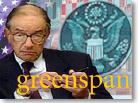|
Greenspan nips at bank bill
|
 |
April 28, 1999: 12:08 p.m. ET
Fed chairman repeats opposition to bank subsidiaries dealing in securities
|
NEW YORK (CNNfn) - Federal Reserve Chairman Alan Greenspan Wednesday reiterated his opposition to legislation that would allow banks to engage in securities dealing and other financial activities through subsidiaries rather than through an affiliated non-bank holding company.
In testimony before a House Commerce subcommittee, Greenspan said he believed banks should have the power to engage in non-banking activities. But, he added, they should not be able to do so on the strength of the credit of the federal government, which backs the assets of the nation's banks.
Greenspan said the proposed House legislation, H.R. 10, "is potentially a step backward to greater federal subsidization, and eventually to more regulation to contain the subsidiaries."
He said the Fed is of the view that despite the desirability of increased powers for banks, "the long-term stability of U.S. financial markets and the interests of the American taxpayer would be better served by no financial modernization bill rather than one that allows the proposed new activities to be conducted by the bank."
Greenspan's position puts him at odds with Treasury Secretary Robert Rubin and the Clinton administration, who favor the operating subsidiary approach to expanded services.
The Fed chairman expressed concern that the government would, in effect, be subsidizing the banks' more speculative activities because its backing reduces the cost of capital. "The lower cost of funding gives banks a distinct competitive advantage over nonbank financial competitors, and permits them to take greater risks than they could otherwise."
Using a subsidiary was also seen by Greenspan as increasing the potential risk to the bank as a whole. "Losses in financial markets -- large losses -- can occur so quickly that regulators would be unable to close the failing operating sub as contemplated by H.R. 10 before the subsidiary's capital ran out," he said. "Indeed, losses might continue to build, producing negative net worth in the subsidiary."
Greenspan said the holding company structure would allow the banks to accomplish what's sought in the House proposal, to "eliminate the inefficiencies of the current Great Depression regulatory structure and to create a system more in keeping with the technology and markets of the 21st century."
"We believe the holding company structure is the most appropriate and effective one for limiting transfer of the federal subsidy to new activities and fostering a level playing field both for financial firms affiliated with banks and independent firms," the Fed chairman told the panel, which is chaired by Rep. Michael Oxley, R-Ohio.
|
|
|
|
|
 |

|

